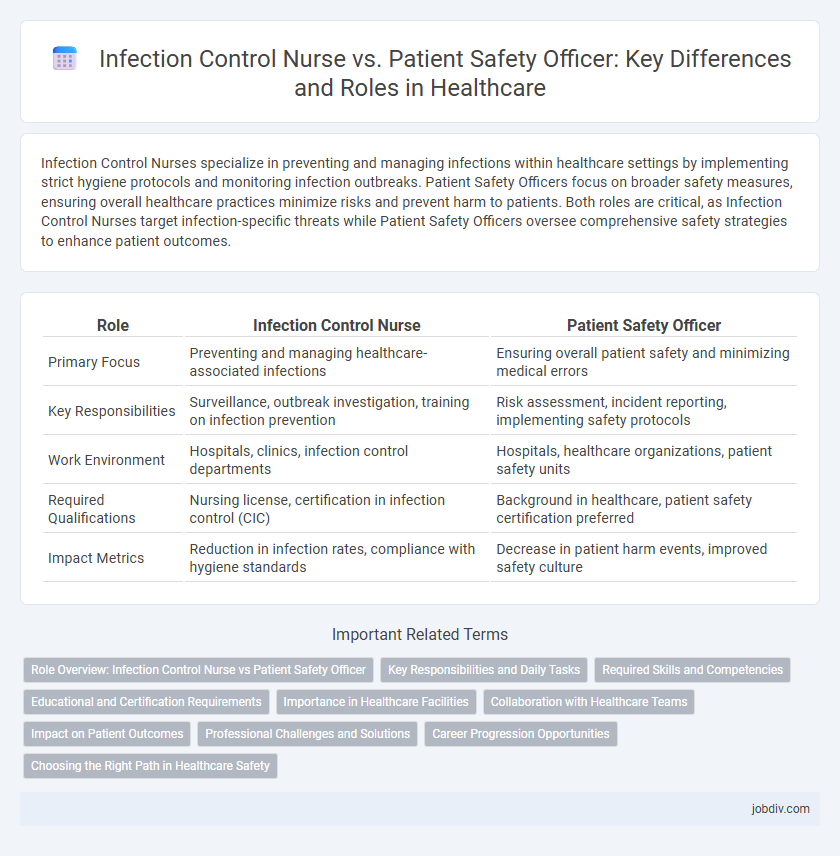Infection Control Nurses specialize in preventing and managing infections within healthcare settings by implementing strict hygiene protocols and monitoring infection outbreaks. Patient Safety Officers focus on broader safety measures, ensuring overall healthcare practices minimize risks and prevent harm to patients. Both roles are critical, as Infection Control Nurses target infection-specific threats while Patient Safety Officers oversee comprehensive safety strategies to enhance patient outcomes.
Table of Comparison
| Role | Infection Control Nurse | Patient Safety Officer |
|---|---|---|
| Primary Focus | Preventing and managing healthcare-associated infections | Ensuring overall patient safety and minimizing medical errors |
| Key Responsibilities | Surveillance, outbreak investigation, training on infection prevention | Risk assessment, incident reporting, implementing safety protocols |
| Work Environment | Hospitals, clinics, infection control departments | Hospitals, healthcare organizations, patient safety units |
| Required Qualifications | Nursing license, certification in infection control (CIC) | Background in healthcare, patient safety certification preferred |
| Impact Metrics | Reduction in infection rates, compliance with hygiene standards | Decrease in patient harm events, improved safety culture |
Role Overview: Infection Control Nurse vs Patient Safety Officer
Infection Control Nurses specialize in preventing and managing healthcare-associated infections by implementing sterilization protocols, monitoring infection rates, and educating staff on hygiene practices. Patient Safety Officers focus on developing and enforcing safety policies, analyzing incident reports, and promoting a culture of safety to reduce medical errors and adverse events. Both roles are critical in healthcare settings, with Infection Control Nurses concentrating on infection prevention while Patient Safety Officers oversee overall patient safety strategies.
Key Responsibilities and Daily Tasks
Infection Control Nurses specialize in preventing and managing healthcare-associated infections through surveillance, staff education, and implementation of hygiene protocols. Patient Safety Officers focus on identifying and mitigating risks in healthcare settings by developing safety policies, reporting incidents, and conducting root cause analyses. Both roles collaborate to enhance patient outcomes, with Infection Control Nurses targeting infection prevention and Patient Safety Officers ensuring overall safety standards.
Required Skills and Competencies
Infection Control Nurses must possess expertise in microbiology, epidemiology, and sterile technique, combined with strong analytical skills to monitor infection rates and implement prevention strategies effectively. Patient Safety Officers require comprehensive knowledge of risk management, patient care protocols, and regulatory compliance, alongside excellent communication skills to advocate for safety improvements across healthcare teams. Both roles demand critical thinking, attention to detail, and proficiency in healthcare technology to enhance clinical outcomes and reduce patient harm.
Educational and Certification Requirements
Infection Control Nurses typically require a registered nursing (RN) degree with specialized certification in infection prevention and control, such as the CIC (Certification in Infection Control). Patient Safety Officers often come from diverse healthcare backgrounds but generally need advanced certification in patient safety, like the CPPS (Certified Professional in Patient Safety), alongside a bachelor's or master's degree in nursing, healthcare administration, or a related field. Both roles demand ongoing education to stay current with evolving standards in healthcare quality and safety.
Importance in Healthcare Facilities
Infection Control Nurses play a critical role in healthcare facilities by implementing protocols that reduce the spread of infectious diseases and safeguard patient health. Patient Safety Officers focus on identifying, evaluating, and mitigating risks to ensure overall patient safety and prevent medical errors. Both positions are essential to maintaining a secure healthcare environment and improving patient outcomes through specialized oversight and intervention.
Collaboration with Healthcare Teams
Infection Control Nurses collaborate closely with healthcare teams to implement protocols that prevent the spread of infections, utilizing surveillance data and evidence-based practices. Patient Safety Officers work alongside multidisciplinary teams to identify risks, develop safety strategies, and promote a culture of safety within healthcare settings. Their synergy enhances overall patient outcomes by integrating infection prevention measures with broader safety initiatives.
Impact on Patient Outcomes
Infection Control Nurses play a critical role in reducing healthcare-associated infections (HAIs) by implementing evidence-based protocols and monitoring compliance, directly improving patient recovery rates and reducing morbidity. Patient Safety Officers focus on broader systemic safety measures, including error reporting, risk assessment, and staff training, thereby minimizing medical errors and adverse events. Together, their integrated efforts significantly enhance overall patient outcomes by fostering a safer clinical environment and promoting high-quality care.
Professional Challenges and Solutions
Infection Control Nurses face challenges like managing antibiotic resistance and ensuring adherence to sterile protocols, while Patient Safety Officers focus on minimizing medical errors and enhancing reporting systems. Addressing these issues requires continuous education, implementation of evidence-based practices, and fostering interdisciplinary collaboration. Leveraging technology, such as electronic health records and surveillance software, enhances monitoring and timely intervention in both roles.
Career Progression Opportunities
Infection Control Nurses often advance by specializing in epidemiology or health informatics, leading toward roles like Infection Prevention Manager or Director of Infection Control. Patient Safety Officers can progress by gaining expertise in risk management and quality improvement, moving into senior positions such as Patient Safety Director or Chief Quality Officer. Both career paths require continuous education and certification in healthcare safety standards to enhance leadership opportunities.
Choosing the Right Path in Healthcare Safety
Infection Control Nurses specialize in preventing healthcare-associated infections through rigorous protocols and staff education, directly reducing infection rates in clinical settings. Patient Safety Officers focus on broader safety initiatives, analyzing systemic risks and implementing policies to minimize medical errors and adverse events. Selecting the appropriate role depends on prioritizing either targeted infection prevention or comprehensive patient safety management within healthcare safety strategies.
Infection Control Nurse vs Patient Safety Officer Infographic

 jobdiv.com
jobdiv.com